Iranian Mission To UN Denies Recent Communication With US
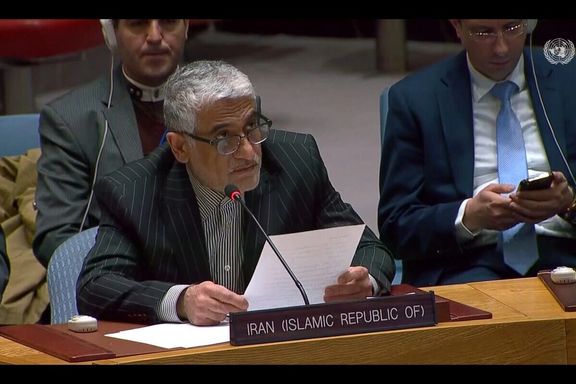
The Iranian mission to the United Nations denied the exchange of messages with the United States over the past two days.

The Iranian mission to the United Nations denied the exchange of messages with the United States over the past two days.
Iranian sources told Al-Jazeera Arabic that “The US sent more than one message to Tehran over the past two days via third parties,” saying that it did not want an open war and warned that escalation would be met with US retaliatory action.
However, Iran’s mission to the UN stated on Tuesday that “any attack on Iranian soil or its interests and citizens beyond its borders will be met with a firm response.”
Iranian-backed militants conducted a drone attack on US troops in northeastern Jordan, near the Syrian border on Sunday.
The attack resulted in the deaths of three US service members and left over 40 others injured, with five suffering from traumatic brain injuries.
Since October, there have been more than 160 recorded attacks targeting American soldiers in Iraq and Syria. However, less than ten percent of the attacks have been retaliated against.
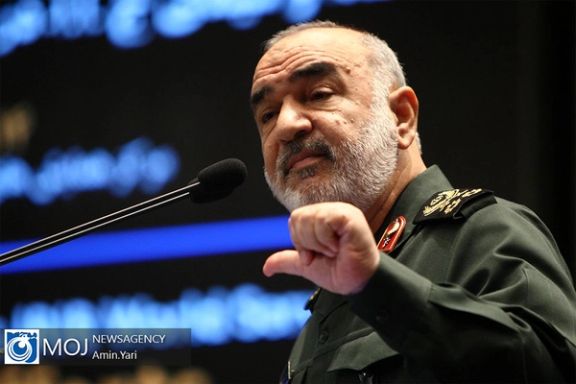
Iran will respond to any threat from the United States, Revolutionary Guards' chief Hossein Salami said on Wednesday, as Washington weighs its response to the killing of American servicemen by Tehran-aligned militants.
"We hear threats coming from American officials, we tell them that they have already tested us and we now know one another, no threat will be left unanswered," Salami said, according to semi-official Tasnim news agency.
A day earlier, the main Iran-backed group in Iraq blamed for killing 3 American soldiers on Sunday, said it was ceasing operations against the US Tuesday, just as President Joe Biden said he had decided how to respond.
Kataib Hezbollah, sponsored by Iran, claimed in a brief statement that it was doing so “to avoid embarrassment for the Iraqi government,” conveniently leaving out the Iranian regime and the imminent threat of US retaliation it faces.
“Our brothers in the Axis [of Resistance], especially in the Islamic Republic [of Iran], do not know how our jihadist work is conducted,” the statement read, attempting to exonerate Iran from the killing of US troops. “They often objected to pressure and escalation against the American occupation forces in Iraq and Syria.”
The statement seems to toe the official line coming out of Iran following the drone attack on a US base in Jordan last weekend: that Iran has had nothing to do with it.
President Biden confirmed Tuesday that he saw Iran responsible for the fatal attack “in the sense that they’re supplying the weapons” to Kataib Hezbollah. He reiterated his wish, nonetheless, to avoid “a wider war” in the region. “That’s not what I’m looking for,” Biden said.
The US President has vowed a “strong” response, leaving the experts to speculate about its nature and the timing.
“It is very possible that what you’ll see is a tiered approach here, not just a single action, but essentially multiple actions,” the White House national security spokesman John Kirby told reporters Tuesday. He too emphasized that the Biden administration is not looking for a war with Iran.
Iranian officials maintain that the country has had no hand in the killing of US forces. But the regime outlets have been consistently boasting about the Axis of Resistance as a legacy of Qassem Soleimani, the IRGC commander killed by a US drone strike in January 2020.
Iran’s ultra-hardline daily Kayhan –which many believe to reflect the thinking of the Supreme Leader Ali Khamenei– has slammed the notion that the regime would “abandon” its Axis allies in the event of US retaliatory attacks.
“[It is implied] that Iran is indifferent to aggression against its allies and is only sensitive to its own soil,” Keyhan writes. “To the contrary, Iran will not abandon its allies… and warns that any aggression will be met with more painful strikes by the resistance front.”
Many in Washington blame the Biden administration for Iran’s increasingly emboldened stance, even calling his policy “appeasement.”
President Biden seems to have been caught in two minds as he tries to strike a balance between deterring Iran and its proxies and avoiding a wider, full-scale war that would further engage the US military. Still, many experts believe that a consequential strike is inevitable this time. US official statements seem to confirm this.
“We will respond, we will respond strongly, we will respond at a time and place of our choosing,” said secretary of state Antony Blinken, meeting NATO secretary general. “Obviously, I’m not going to telegraph what we might do in this instance or get ahead of the president, but I can, again, tell you … we will respond. And that response could be multi-levelled, come in stages and be sustained over time.”
It’s hard to measure the effects of this “wait and see” approach. On the one hand, it signals doubt and lack of determination –which may be comforting and even encouraging for Iran’s leadership. On the other hand, it could exacerbate their apprehension and make them more cautious as they try to guess the time and manner of the American blow.

Yemen's Iran-backed Houthi group said on Wednesday it would keep up attacks on US and British warships in the Red Sea in what it called acts of self-defense.
In a statement, the group's military spokesperson said all American and British warships participating in "aggression" against its country were targets.
The Houthi announcement came after another Iranian proxy force in Iraq, Kataib Hezbollah, announced on Tuesday that it was suspending attacks against US forces.
The Houthis, who control the most populous parts of Yemen, have been attacking ships in and around the Red Sea, saying they are acting in solidarity with Palestinians in the Gaza war. The attacks began in mid-November after Iran’s ruler Ali Khamenei urged Muslim countries to blockade Israel.
The US and Britain have launched retaliatory strikes on Houthi targets in Yemen and returned the militia to a list of terrorist groups as turmoil from the Israel-Hamas war spreads through the region.
The Houthis attacks on the Red Sea have added an economic element to the turmoil by targeting shipping in and around the Red Sea.
The Houthis fired missiles at US warship USS Gravely, the statement added. On Tuesday night, the US military's central command said they had shot down one anti-ship cruise missile fired from Yemen towards the Red Sea with no damage reported.
The Houthi attacks have primarily targeted container vessels. Many fuel tankers have kept using the route.
Some shipping companies have suspended transits through the Red Sea and taken much longer, costlier journeys around Africa to avoid being attacked.
Houthis say they will persist with their military operations until a ceasefire is agreed in Gaza.

Discussions persist in Iran over the contentious ban imposed by regime hardliners preventing former President Hassan Rouhani from running in the March 1 elections.
Rouhani’s disqualification is primarily attributed by local media to his perceived low performance during his presidency, the complete removal of the reformists from the political arena by the authoritarian camp, and the regime’s preference for minimal electoral participation.
However, these explanations do not fully address the core reason behind his disqualification. To comprehend this story on a broader scale, one must consider three key realities unfolding at the pinnacle of the power structure within Iran's Islamic Republic:
First, Ali Khamenei, who is currently 84 years old, has undergone significant health issues, including a surgery a decade ago. Over the past ten years, observers have witnessed a noticeable decline in his physical and mental faculties during his televised speeches. The Leader's office and the commanders of the Islamic Revolutionary Guard Corps (IRGC) cannot afford to be indifferent to the question of succession. Additionally, during the later stages of leadership in dictatorial regimes, as was evident in the final years of Ayatollah Khomeini's rule, influential figures within the system tend to play a more pivotal role in determining the future leader.
Second, over the past decade, there have been four significant and somewhat unpredictable disqualifications in Iran. These include the disqualification of Akbar Hashemi Rafsanjani for the presidency in 2013, Hassan Khomeini's exclusion from the Experts Assembly membership in 2015, Ali Larijani's disqualification for the presidency in 2021, and now Hassan Rouhani's disqualification from the Experts Assembly membership. These figures hold influential positions and have the potential to impact various aspects of the establishment, including the issue of succession. Their disqualification effectively marginalizes them and removes them from the political landscape.
Third, Both Hassan Khomeini and Sadegh Larijani emerged as serious contenders for leadership positions over the past decade, owing to their age, political profiles, and positions within the seminary. Hassan Khomeini, the grandson of the Islamic Republic's founder, currently teaches advanced jurisprudence courses and represents the reformist camp's candidate for the leadership role. Sadeq Larijani, the son of Mirza Hashem Amoli (a prominent Shia source of emulation) and the son-in-law of Vahid Khorasani (a high-ranking Shia authority in Qom Seminary), held influential positions within the traditionalist Islamist camp.

Nevertheless, individuals loyal to the Supreme Leader have sought to obstruct the ascent of these two figures over the past decade. Hassan Khomeini, in particular, has faced verbal attacks from Basij members and government insiders during official ceremonies, especially on the anniversary of his grandfather's death. Khamenei's supporters have accused him and his family of leading an aristocratic lifestyle. His disqualification has dashed the hopes of his followers to influence the Experts Assembly after Ali Khamenei's eventual passing.
Sadeq Larijani was abruptly removed from his position as head of the judiciary in 2021, prior to the end of his usual ten-year term. A high-profile corruption case involving one of his deputies was publicized at that time. Furthermore, he was ousted from the Guardian Council. Mohammad Yazdi, the head of the Qom's Instructors Association, publicly criticized Larijani for establishing an opulent office in Qom. Presently, he heads the Expediency Council but is largely sidelined by other institutions.
The perception of Ali Khamenei's impending demise has led to the elimination of potential rivals to Mojtaba Khamenei, his son and likely successor. Those who could have played a significant role in the Experts Assembly after Khamenei's demise have been sidelined. The establishment seeks individuals who will align with Mojtaba's vision and ensure a smooth transition to the throne, unopposed.
The existence of single-candidate elections, such as those in South Khorasan province during this term, where Ebrahim Raisi was the sole nominee, and numerous single-candidate elections in the past, underscores the process of reserving Experts Assembly seats for those loyal to Khamenei, his office, and the IRGC's intended successor.
Leadership succession within the Islamic Republic holds immense significance for the ruling elite, as it is a matter they cannot leave to chance. Over the past decade, they have carefully engineered individuals and institutions that could play a role in determining the future leader. The fate of the Islamic Revolutionary Guard Corps, the regime's expansionist agenda, and the future of the Shia clergy, invested in for five decades, hinge on the identity of the future leader. Trillions of dollars, either plundered or yet to be gained, hang in the balance.
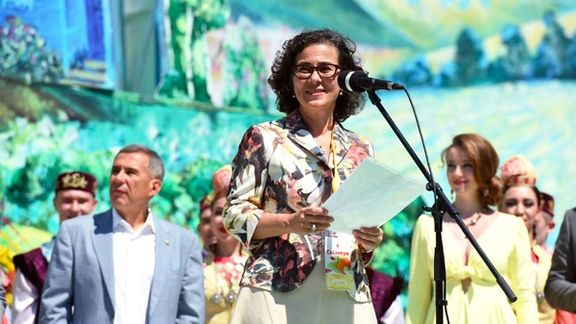
A coalition of 25 human rights organizations have urged UN Deputy High Commissioner for Human Rights Nada Al-Nashif to postpone her upcoming visit to Iran.
The visit will take place just after Iran executed five prisoners it accused of collaborating with Israel in a sham trial. In recent weeks, the authorities have been hanging an average of three persons a day.
In a joint letter released Monday, these organizations underlined the responsibility of the Office of the United Nations High Commissioner for Human Rights’ (OHCHR) to prevent its legitimate engagement with the Islamic Republic from becoming a tool to undermine critical mechanisms for advancing human rights in Iran.
They said they acknowledge the value of dialogue and engagement and the legitimate interest of OHCHR in engaging with authorities from all countries on human rights challenges but some factors including the timing of the visit which is only a few weeks before the start of the 55th session of the UN Human Rights Council (HRC “raise very serious concerns”.
“Informed by past experiences, we can anticipate that Iranian authorities will attempt to instrumentalise their formal engagement with your Office and use it as a propaganda tool to undermine support for these existing and very needed monitoring, reporting and investigative mechanisms established by the HRC,” the letter said while urging Al-Nashif to reconsider the timing of her visit and implement a robust strategy to mitigate this risk.
Other civil society groups, political figures, and human rights activists have also made similar appeals to Al-Nashif.
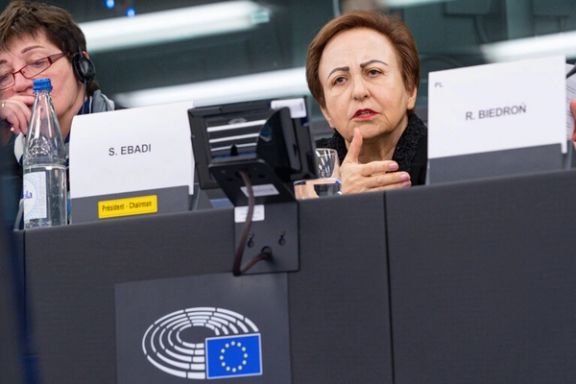
In a message addressed to Al-Nashif on her Instagram Thursday, Iranian Peace Nobel Laureate Shirin Ebadi pointed out that ahead of her visit to Iran at least four prisoners including a protester, Mohammad Ghobadlou, and a Kurdish political prisoner, Farhad Salimi, were executed last week after unfair trials and in violation of the Islamic Republic’s own laws.
Ebadi urged Al-Nashif to cancel her visit in protest to “extra judicial and increasing executions to prevent the regime from taking advantage of it and using it for propaganda.
Some have also urged the UN official to refuse to wear the hijab during her visit as Iranian authorities require.
“Remember that dozens of women were killed in the struggle against compulsory hijab, and dozens of men who stood up together with Iranian women lost their lives in the hands of the Islamic Republic when you wear a headscarf to please the officials of the Islamic Republic,” some family members of the victims of the downing of Flight PS752 by Revolutionary Guards (IRGC) wrote in an open letter to Al-Nashif.
The Campaign to Free Political Prisoners in Iran urged Al-Nashif to set four preconditions for her visit to Iran, namely, independent visits to prisons, independent meetings with political prisoners sentenced to death, and to publicly announce that she will not wear the hijab during her visit.
UN Human Rights Office spokesperson Marta Hurtado told Radio Farda, the Persian Service of Radio Free Europe in Prague on Tuesday, that the aim of Al-Nashif’s visit to Iran is investigating the possibility of chances for improvement of human rights situation in Iran. She added that it is important to look for ways to discuss these concerns, she said.
In June 2023 Al-Nashif presented a report to the Human Rights Council in Geneva on Wednesday saying that the situation in the Islamic Republic is aggravated against the backdrop of continuously worsening socio-economic conditions and sanctions. However, Tehran always engaged in serious rights violation even during better economic periods.
The report examined developments since the death of 22-year-old Mahsa (Jina) Amini in September in the custody of the morality police that sparked widespread protests throughout the country and said there had been a spike in death sentences and executions during that period.
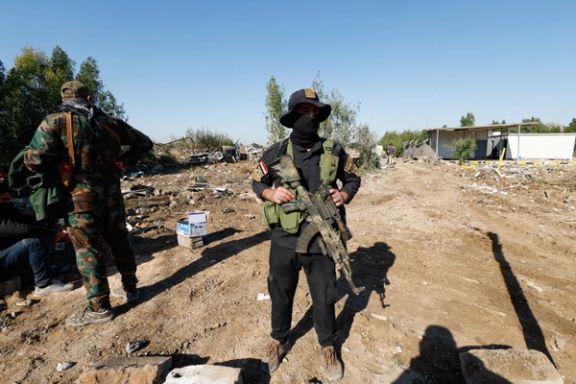
Iran-backed Iraqi armed group Kataib Hezbollah says it is suspending all its military operations against US troops in the region, after Washington signaled it is ready to respond.
The group said in a statement that its decision aimed at preventing "embarrassment" to the Iraqi government, as President Joe Biden said he had made up his mind about responding to those who were behind a deadly attack on US troops.
The decision follows the killing of three US troops in a drone attack near the Jordan-Syria border - an attack that the Pentagon said bore the "footprints" of Kataib Hezbollah, though a final assessment had not yet been made. However, after three days, the White House is yet to order a military response.
Founded in the aftermath of the 2003 US-led invasion of Iraq, Kataib Hezbollah is one of the elite Iraqi armed factions closest to Iran.
It is the most powerful armed faction in the Islamic Resistance in Iraq, an umbrella group of hardline Shi'ite armed groups that have claimed more than 150 attacks on US forces since the Gaza war began in early October.
Iraq's government is backed by parties and militias close to Iran, though not directly by the hardline groups that have been firing on US forces, Western and Iraqi officials say.
Baghdad has condemned the attacks while also saying regional escalation would continue as long as the Gaza war went on.
US Defense Secretary Lloyd Austin vowed on Monday the US would take "all necessary actions" to defend its troops after the deadly drone attack, even as President Joe Biden's administration stressed it was not seeking a war with Iran.